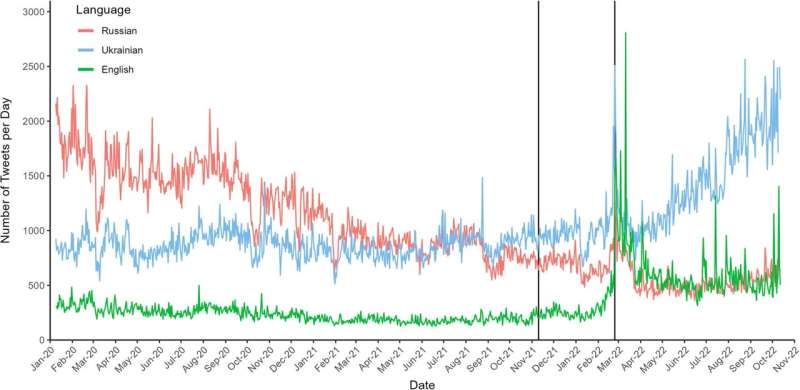This article has been reviewed according to Science X's editorial process and policies. Editors have highlighted the following attributes while ensuring the content's credibility:
fact-checked
trusted source
proofread
War changes language: More Ukrainian, less Russian

A multidisciplinary team of researchers from LMU, the University of Bath, and the Technical University of Munich (TUM) have analyzed changes in the use of language on social media in Ukraine before and during the Russian war of aggression.
"Apparently the war is causing people to increasingly turn away from the Russian language," says Daniel Racek, lead author of the team's study, which has been published in the journal Communications Psychology. Racek is a doctoral student under Professor Göran Kauermann at LMU's Department of Statistics.
Language plays a decisive role in the post-Soviet identity of Ukraine. Many Ukrainians are fluent in both Russian and Ukrainian. Until recently, however, only around half to two-thirds of the population named Ukrainian as their main native language.
Since the Euromaidan protests, sparked by the sudden preliminary decision not to sign the Association Agreement with the EU, and the subsequent annexation of Crimea in 2013/2014, there is evidence that this proportion has increased due to Russian military intervention.
Together with his team, Racek investigated more than 4 million tweets with Ukrainian location information posted by around 63,000 users of Twitter (now X) from the period between January 2020 and October 2022. Using artificial intelligence (AI) and statistical analysis, the researchers distinguish between effects that are attributable to changes in user behavior and effects that are based on user fluctuations.
The results show a long-term shift from Russian to Ukrainian, which was already underway before the war, but that significantly accelerated upon the outbreak of war, and is mainly attributable to changes in behavior.
The researchers conjecture that the observed change in behavior is very much a political reaction. Users want to distance themselves from Russia and any support for the war, and so they consciously decide to use less Russian and in many cases avoid using Russian altogether.
More information: Daniel Racek et al, The Russian war in Ukraine increased Ukrainian language use on social media, Communications Psychology (2024). DOI: 10.1038/s44271-023-00045-6
Provided by Ludwig Maximilian University of Munich





















